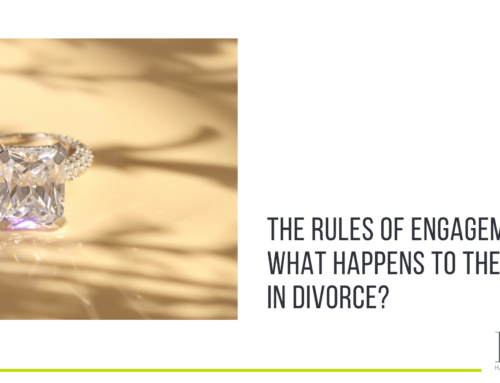From houses and cars to business investments, there are a number of reasons you may wish to provide a financial gift for your child. In fact, according to recent figures from the Institute for Fiscal Studies, parents are set to give around £17bn in gifts and informal loans in 2023 alone.
But what happens when your child gets married, or uses your financial contribution to buy a house in joint names with their partner, and they end up separated or divorced? How can you make sure that any gifts given during the marriage are protected during their divorce?
Is your contribution actually a gift?
It might sound obvious, but this is a question worth thinking about. Are you giving the gift free and clear, free of any obligation to pay it back? If so, there’s no need for any formal protection or documentation, but you’ll have to be at ease with the fact that what happens to that money, and how it is used, is out of your control. In the event of a divorce, you won’t be able to rescind the gift, and start expecting repayments from your child’s ex-partner or spouse.
If, on the other hand, you intend for your contribution to be paid back to you in the future, or you want to make sure that it’s protected solely for your child in the event that they separate from their spouse or partner, then you’ll need to explore a number of options.
At this point, it’s worth saying that before you make any decisions about giving a financial gift to your child, seeking independent legal advice about what that entails, and what protections are available to you is a good idea.
What are the options?
Draw up a loan agreement
If you’re giving a loan rather than a gift, make sure you draw up an appropriate loan agreement document. This should stipulate specific repayment terms, including what will happen in the event of your child’s separation or divorce. Any loan agreement should be in writing, contain as much information as you can give, and be signed by all the relevant parties. You’ll find it more challenging to defend any financial gifts in a divorce without written evidence of the terms in which they were given.
As a general rule during divorce proceedings, the needs of both your child and their ex-spouse will come into play. If there’s no formal agreement regarding the loan, and there aren’t enough assets in the financial pot to meet the needs of both parties, the harder it will be to demonstrate that your gift should be returned.
Pre and postnuptial agreements
Pre and postnuptial agreements are a good investment for any couple, but may be of particular importance for those couples who have been given a financial gift from parents. Their purpose is to identify who is responsible for what during the course of the marriage, and who any assets will belong to in the event of a divorce. Whilst they’re not legally binding in the UK, they will be taken into consideration by the courts during any proceedings and, if various criteria are met, can be upheld.
If you intend to give financial gifts to your children or grandchildren, you may want to suggest that they have these recorded in the agreement. You may also want to consider including any expected inheritance. It’s always better for the agreements to be entered into before the gift or inheritance is received, so early advice is recommended.
Bear in mind however that open and honest communication with your children here is crucial. Discussions here can be difficult, and can lead to your children questioning even the best of intentions.
Cohabitation agreements
A cohabitation agreement sets out what the arrangements will be with regard to property, finances and any children a couple might have during the course of their relationship. In addition, it will set out what will happen if the relationship comes to an end. In most property disputes, there is a dispute about what each person intended in respect of ownership and financial interest. If it’s recorded in a signed contract, it can avoid disagreement.
Such an agreement could make provision for any gifts you give to your child, and in order to be legally binding, it will need to be drawn up by a family solicitor who has provided the necessary legal advice.
Declaration of trust
If you decide to provide a financial gift to help with the purchase of a property, a Declaration of Trust is a worthwhile consideration. This is a document which explains who has a financial interest in a property, and how much this is, if the financial interests differ from who are registered as the owners of the property.
It might state that in the event of a separation, the deposit is returned to your child, or perhaps stipulate that they own a larger share of the property in light of the financial gift.
Trust funds
You may wish to set up a trust fund in your child or even your grandchildren’s names, as these can be a useful tool to protect any gifts or inheritance. But again, it’s advisable to seek financial and legal advice here, as trusts are an incredibly complex area of law.
However you decide to help your family, the important thing is that you’re comfortable and happy with the arrangement. Here at Harrogate Family Law, we’ve got the legal advice and expertise that you need, as well as a trusted network to ensure that you can look to the future with confidence. Get in touch today.






